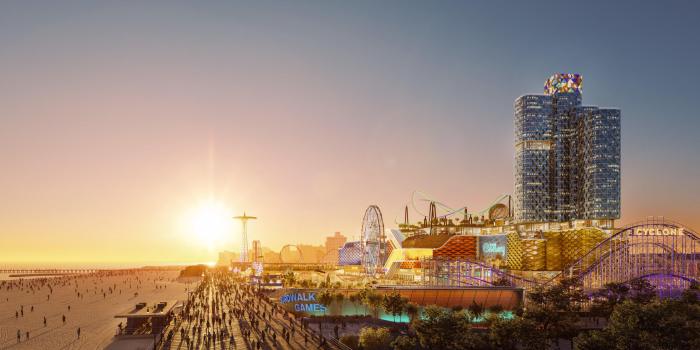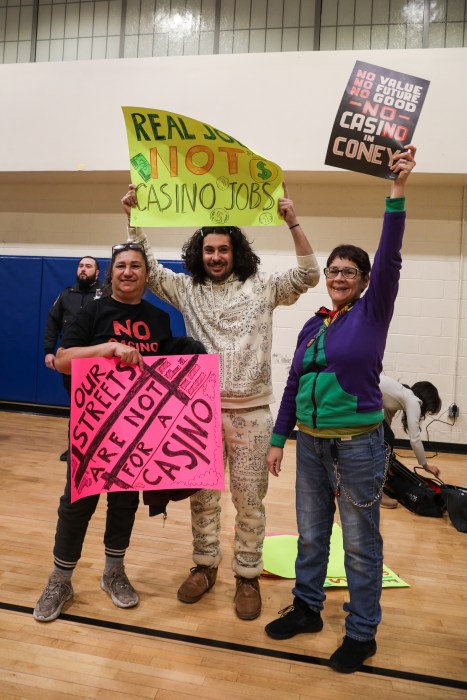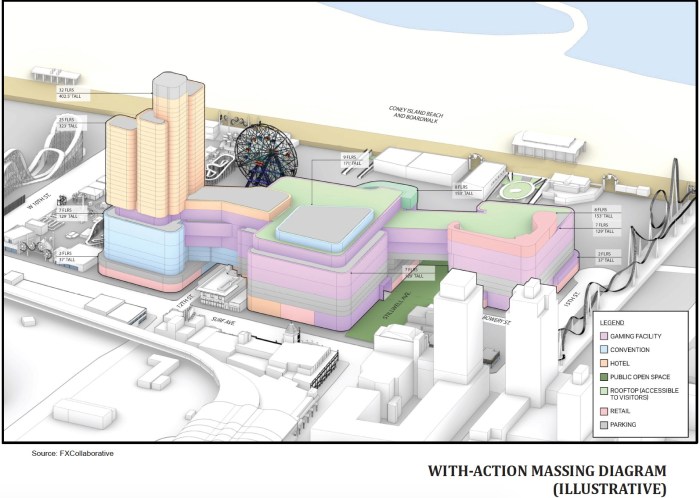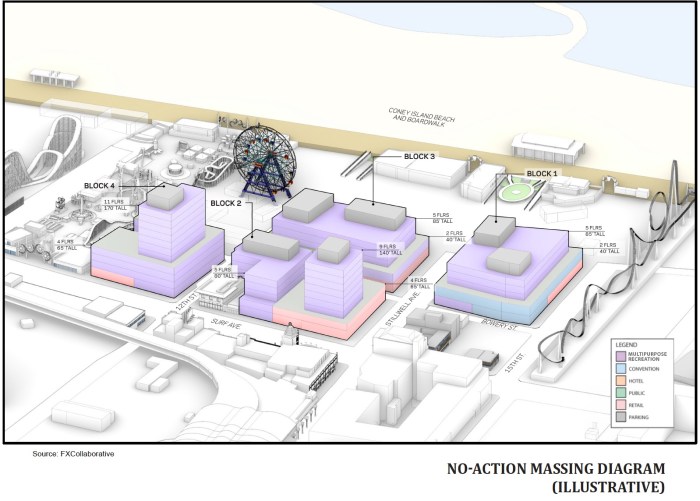A southern Brooklyn group board voted in opposition to altering land use guidelines for the proposed Coney Island on line casino on Wednesday night time within the undertaking’s newest setback.
Neighborhood Board 13 voted 24-11 to disclaim builders’ software to shut a part of Bowery Road and buy air rights above current buildings within the nabe to make manner for the ability, dubbed “The Coney.” Eight board members abstained from voting, and three recused themselves from the proceedings.
Although the board’s vote is strictly advisory and the land use software shouldn’t be straight tied to The Coney’s push to get a state gaming license, public approval does play a big half in who will obtain these licenses — and Coney Islanders have robust emotions on all sides.
On the Jan. 22 board assembly, locals packed the room to capability, many waving indicators supplied by opposing organizers: “Stop the Phoney” and “No no no casino in Coney Island” for these in opposition to the undertaking; “Yes to Jobs!” and “Build it Now!” for these in favor.
Supporters of the on line casino on the Jan. 22 assembly. Photograph courtesy of Eric Koch/The Coney
The Coney, as builders envision it now, could be a 1,431,730-square-foot facility stretching throughout a number of blocks close to Stillwell Avenue and West twelfth Road, constructed up above current buildings and related by enclosed “sky bridges.”
The group behind the on line casino, headed by Joe Sitt’s Thor Equities, has promised it might carry jobs and year-round financial alternative to the nabe, and stated this month it might create a $200 million public belief fund if the on line casino is constructed.
Some Coney Islanders stated Wednesday that the neighborhood may use all the assistance it could actually get.
“My ‘yes’ to The Coney is for the investments in our community,” stated resident Joseph Watson. “I’m talking about the kids and the young men and women that live in NYCHA, that are renters, OK, they’re not homeowners. These people, my people, we need an opportunity.”
Even when the roles supplied by the on line casino are “small,” he stated, they may very well be the possibility locals must get a step up.
“We do know that they’re speaking about union jobs,” Watson stated. “Even if they weren’t, the income that they’re making is already above what they’re making in the household already. There’s so many people here that are living below poverty.”
 A rendering of The Coney and the boardwalk. Picture courtesy of The Coney
A rendering of The Coney and the boardwalk. Picture courtesy of The Coney
Others stated that even when Coney Island is struggling, the on line casino isn’t what it wants.
Patrick Wall, government director of Coney Island USA, stated his enterprise has been “trying to survive” for years, and that he would like to see new jobs within the neighborhood.
“This casino is not that,” he stated. “We’re asking for a giant fort to come and plop down on top of our entire amusement district across three blocks. That’s crazy! It’s going to keep people locked in, they’ve got food, they’ve got accommodations, they’ve got entertainment. They’re never going to come outside, they’re never going to give us money.”
Coney Island USA pupil Jake Turner agreed.
“Big corporations see Coney Island not as a community, but a commodity,” he stated. “A place they can extract wealth from with no regard for the people who live here.”
Neighborhood Board member Yelena Makhnin recalled visiting Coney Island along with her household simply days after she moved to the U.S. from the Soviet Union in 1992. The primary photographs she took within the U.S., she stated, had been of her youngsters subsequent to the Surprise Wheel.
 Opponents of the proposed on line casino at a Neighborhood Board 13 assembly on Jan. 9. Photograph by Erica Value
Opponents of the proposed on line casino at a Neighborhood Board 13 assembly on Jan. 9. Photograph by Erica Value
Makhnin stated The Coney’s guarantees weren’t sufficient, since Neighborhood Advantages Agreements are usually not legally enforceable.
“Until I see a binding document, it’s still a promise,” she stated.
Sheila Smalls, a fellow board member, urged her colleagues to suppose otherwise. On the west aspect of Coney Island, the place Smalls lives, nearly all the things residents used to get pleasure from is gone, she stated — eating places, pharmacies, film theaters.
“All of these things now are a thing of the past,” she stated. “Even this community board has to find a place for us to have meetings, because we don’t have a place.”
Different tasks, like rezonings and a brand new shelter, have gone ahead despite the fact that the group voted in opposition to them, Smalls stated.

 High, a rendering of the on line casino if the land use software is authorised. Backside, the on line casino if constructed with current land use laws. Renderings courtesy of FXCollaborative/New York Metropolis Planning
High, a rendering of the on line casino if the land use software is authorised. Backside, the on line casino if constructed with current land use laws. Renderings courtesy of FXCollaborative/New York Metropolis Planning
“So please, listen up, everybody has an opinion…if we have an olive branch, reach out and see what it’s about before you say no,” she stated. “When you say no, you’re closing the door on everything, and I don’t see any other money coming from anywhere else.”
The appliance will subsequent go earlier than the Brooklyn Borough President, then the Metropolis Planning Fee, then the Metropolis Council, which is able to make the ultimate choice to approve or deny.
In an announcement, The Coney thanked its supporters, and emphasised that the group board vote is not going to straight influence whether or not or not the on line casino will get constructed — simply what it is going to appear to be if it does. If the land use software is denied, however The Coney will get a state gaming license, the on line casino buildings could be shorter and constructed on separate tons, with out the sky bridges.
“It is disappointing that some prominent members of the community have [misled] others into thinking this ULURP process is a de facto vote on whether or not this project can move forward,” a on line casino rep stated. “As the outright owners of the fully developable lots, The Coney remains the bid most poised to put shovels in the ground on day one to kickstart what will be an economic revival for Coney Island and Southern Brooklyn.”





